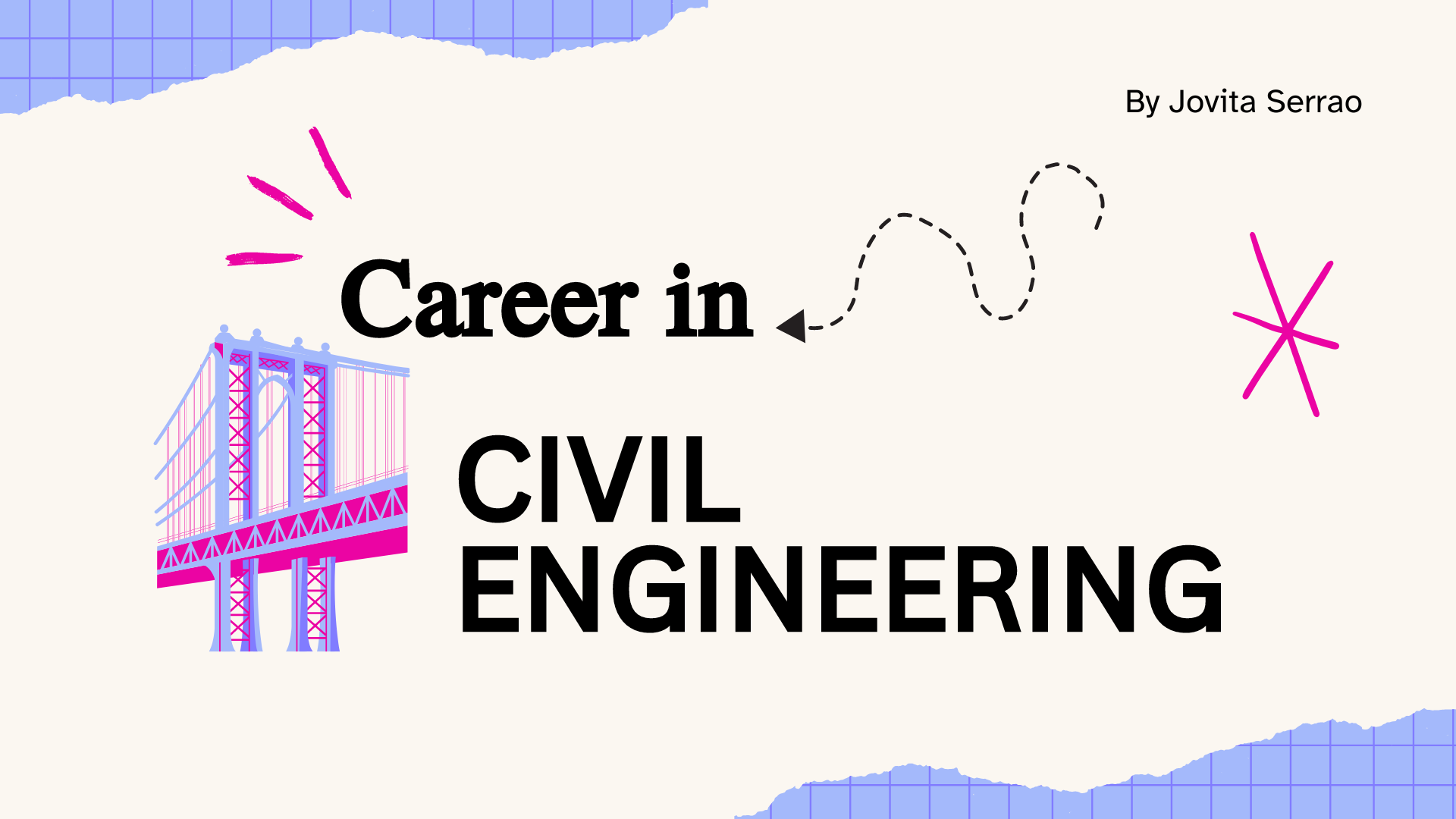
Building the Future: A Comprehensive Guide to a Career in Civil Engineering
Have you ever looked at a towering skyscraper or an intricate bridge and wondered about the engineering marvels behind them? Are you curious about the role of Civil Engineering in shaping our infrastructure and environment? Why should you consider a career in Civil Engineering? What specializations are available, and what does a typical day look like for a civil engineer? This blog provides a comprehensive guide for students in India on pursuing a career in Civil Engineering.
Why Choose a Career in Civil Engineering?
A career in Civil Engineering offers the chance to make a tangible impact on society by designing, constructing, and maintaining infrastructure. Civil engineers play a crucial role in developing and maintaining public works such as roads, bridges, buildings, and water supply systems. This field is perfect for those interested in large-scale projects and passionate about contributing to sustainable and functional infrastructure.
Specializations in the Career
Civil Engineering encompasses several specializations, including:
- Structural Engineering
- Geotechnical Engineering
- Environmental Engineering
- Transportation Engineering
- Water Resources Engineering
Day-to-Day Activities of a Civil Engineer
The daily activities of a civil engineer can vary based on their specialization and role but generally include:
- Designing and analyzing structural components and systems
- Overseeing construction projects and ensuring adherence to plans and specifications
- Conducting site inspections and evaluating project progress
- Collaborating with architects, contractors, and other engineers to solve design and construction challenges
- Managing project budgets, schedules, and resources
- Ensuring compliance with safety standards and regulations
Eligibility Criteria
To pursue a career in Civil Engineering, candidates in India typically need:
Pathways After SSC (10th Grade):
- Enroll in a Diploma in Civil Engineering, which can be followed by lateral entry into the second year of a Bachelor’s degree program.
Pathways After HSC (12th Grade):
- Complete 12th grade with a focus on Physics, Chemistry, and Mathematics (PCM).
- Qualify for entrance exams such as JEE Main, state-level engineering entrance exams, or specific exams for civil engineering programs.
Higher Education:
- A Bachelor’s degree in Civil Engineering (B.E./B.Tech).
- Advanced positions may require a Master’s degree (M.E./M.Tech) or PhD.
Job Opportunities
Civil engineers have diverse job opportunities in various sectors, including:
- Construction and infrastructure companies
- Government agencies and municipal corporations
- Consulting firms
- Real estate developers
- Environmental and sustainability organizations
- Research and development institutions
Salary
Salaries for civil engineers in India can vary based on experience, location, and specialization. On average:
- Entry-level engineers can expect to earn between INR 3 to 6 lakhs per annum.
- Mid-level professionals may earn between INR 6 to 12 lakhs per annum.
- Senior-level engineers and managers can earn INR 12 lakhs and above per annum.
Key Skills Required
To excel in Civil Engineering, one must possess:
- Strong analytical and problem-solving skills
- Proficiency in engineering design and analysis software
- Excellent communication and teamwork abilities
- Project management skills
- Knowledge of construction methods, materials, and safety standards
- Ability to work under pressure and manage complex projects
Industry Trend/Future Prospects
The future of Civil Engineering is evolving with trends such as:
- Integration of smart technologies and IoT in infrastructure
- Emphasis on sustainable and green building practices
- Advances in construction materials and techniques
- Increased focus on resilient infrastructure to withstand natural disasters
- Growth in urban planning and development projects
Options of Institutes
Top Institutes in India:
- Indian Institute of Technology (IIT) Bombay
- Indian Institute of Technology (IIT) Delhi
- Indian Institute of Technology (IIT) Madras
- Indian Institute of Technology (IIT) Roorkee
- Indian Institute of Technology (IIT) Kanpur
Top Institutes in Maharashtra:
- College of Engineering, Pune
- Veermata Jijabai Technological Institute (VJTI), Mumbai
- Dr. D.Y. Patil Institute of Technology, Pune
- Sardar Patel College of Engineering, Mumbai
- K. J. Somaiya College of Engineering, Mumbai
Fees
The cost of a Civil Engineering program in India can vary widely:
- Diploma programs: INR 20,000 to 50,000 per year
- Bachelor’s programs: INR 1 to 2 lakhs per year in government colleges; INR 2 to 5 lakhs per year in private colleges
- Master’s programs: INR 1 to 3 lakhs per year
Scholarships/Loans
Many institutions offer scholarships and loans, such as:
- National Scholarships (e.g., MHRD scholarships)
- State Government Scholarships
- Institution-specific scholarships
- Education loans from banks and financial institutions
Conclusion
A career in Civil Engineering offers the chance to work on large-scale projects that have a significant impact on society. By developing the necessary skills and staying informed about industry trends, you can unlock numerous opportunities and contribute to the advancement of infrastructure and environmental sustainability. For personalized advice and guidance, feel free to reach out!
Author: Ms. Jovita Serrao
Position: Founder and Career Counselor, Career Pravaas
Contact Information: jovita.s@jetech.co.in
Stay tuned for more insights and guidance on various career paths. If you have any questions or need personalized advice, feel free to reach out!
Keywords: Civil Engineering, career in Civil Engineering, Civil Engineering specializations, day-to-day activities of Civil Engineers, Civil Engineering eligibility criteria, job opportunities in Civil Engineering, Civil Engineering salary in India, career progression in Civil Engineering, key skills for Civil Engineering, industry trends in Civil Engineering, top institutes for Civil Engineering in India, top institutes for Civil Engineering in Maharashtra, Civil Engineering fees, Civil Engineering scholarships and loans, experts in Civil Engineering
